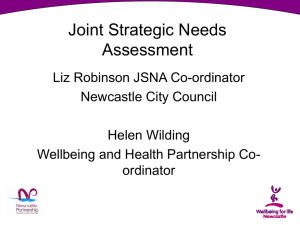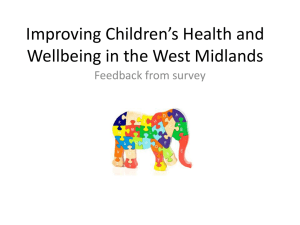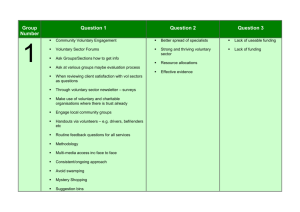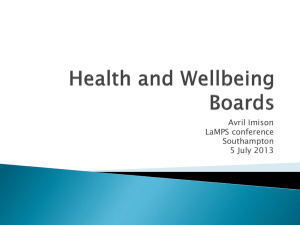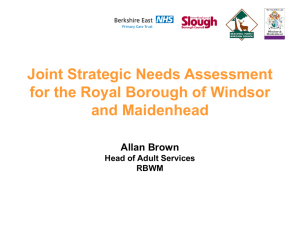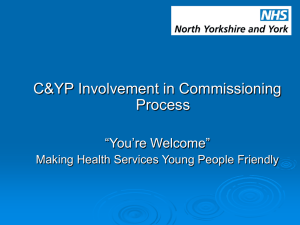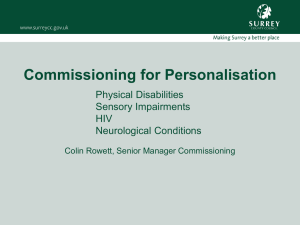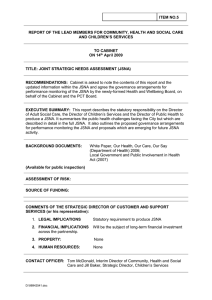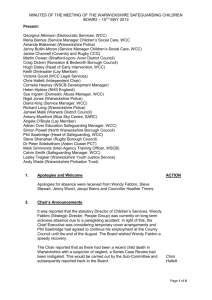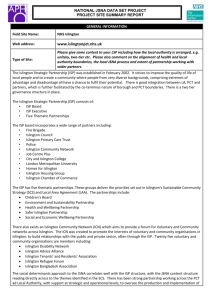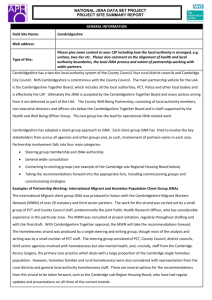Document Information
advertisement
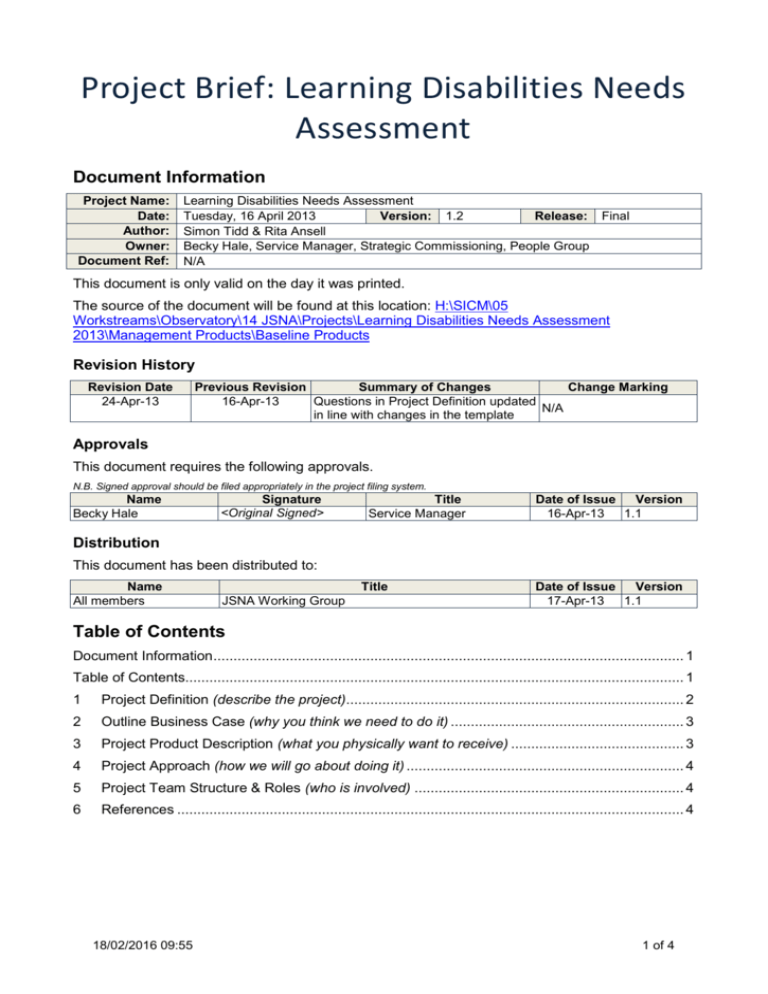
Project Brief: Learning Disabilities Needs Assessment Document Information Project Name: Date: Author: Owner: Document Ref: Learning Disabilities Needs Assessment Version: 1.2 Release: Final Tuesday, 16 April 2013 Simon Tidd & Rita Ansell Becky Hale, Service Manager, Strategic Commissioning, People Group N/A This document is only valid on the day it was printed. The source of the document will be found at this location: H:\SICM\05 Workstreams\Observatory\14 JSNA\Projects\Learning Disabilities Needs Assessment 2013\Management Products\Baseline Products Revision History Revision Date 24-Apr-13 Previous Revision Summary of Changes Change Marking 16-Apr-13 Questions in Project Definition updated N/A in line with changes in the template Approvals This document requires the following approvals. N.B. Signed approval should be filed appropriately in the project filing system. Name Becky Hale Signature <Original Signed> Title Service Manager Date of Issue Version 16-Apr-13 1.1 Distribution This document has been distributed to: Name All members Title JSNA Working Group Date of Issue Version 17-Apr-13 1.1 Table of Contents Document Information ..................................................................................................................... 1 Table of Contents............................................................................................................................ 1 1 Project Definition (describe the project).................................................................................... 2 2 Outline Business Case (why you think we need to do it) .......................................................... 3 3 Project Product Description (what you physically want to receive) ........................................... 3 4 Project Approach (how we will go about doing it) ..................................................................... 4 5 Project Team Structure & Roles (who is involved) ................................................................... 4 6 References .............................................................................................................................. 4 18/02/2016 09:55 1 of 4 1 Project Definition (describe the project) The existing Warwickshire Learning Disabilities (LD) Strategy covers the period from 1st April 2011 to 31st March 2014 and is only based on adults. This strategy will be rewritten in late 2013 to early 2014 and should be informed by an assessment of need and include all ages. In the development of the previous LD Strategy, it became apparent that there was a lack of robust data. Around 5-6 years ago, attempts had been made to capture a comprehensive LD dataset, as part of a national initiative involving GPs but this dataset is no longer available. In addition, there was little access to, and thus a lack of, ‘health’ data to inform the report. Using a broad definition, it is estimated that the LD population in Warwickshire may be as high as 10 thousand, whilst the number of those eligible for health and social care sits at around 2-3 thousand and the number of those with some form of need or vulnerability is estimated to be around 4-5 thousand. In addition, there is evidence that the population profile and their needs are changing as those people with LD are living longer. This has highlighted an increased propensity for dementia and raised issues around an aging carer population, no longer able to support their needs. This project will support an outcome of more intelligent commissioning and will inform future commissioning strategies and intentions. Its scope is to: Include all ages: In the consideration of adults, focus on those with a severe or critical need, but include those with a moderate need and be aware of the future aging LD population and their changing needs When considering children, to play particular attention to the role of early intervention in addressing moderate need Include education, training and employment needs Include health related data Include related housing data specifically in terms of where people are currently living, e.g. residential care, with parents/partners or carers etc. Include information about the match between need and services Focus any forecasting on the period up to 2020 but identify longer term trends Include historical data, where it is available Include qualitative data from consultation with customers, parents, carers and providers Its objectives are: to establish an informed picture of LD need across all ages in Warwickshire, including an associated data-set to deliver the project’s products by the end of October 2013 and no later than November 2013 to deliver products for public dissemination and to inform WCC Commissioners The project and its products will interface with: The Children’s Trust Children and Young People’s Plan Clinical Commissioning Group (CCG) Integration Plans The Market Position Statement (draft) The Vulnerable Children Strategy (draft) The PDSI Strategy The Dementia Strategy The Carers’ Strategy The Autism Strategy The End of Life Strategy Warwickshire’s Child Poverty Strategy Housing with Care (refresh) Strategy (first draft due May 2013) 18/02/2016 09:55 2 of 4 The Transitions Project Does the topic align with Key Stakeholder’s Strategic Priorities (WCC, CCGs, and Districts & Boroughs)? If so, how and what are they? Yes: ☒ No: ☐ LD is mentioned on pages 15,16 and 22 of the HWS and is a priority area under the area of ‘vulnerable communities’ with specific outcomes sought mentioning LD. The educational attainment of children and young people is also a priority under the HWS as detailed on page 21. In addition LD services account for a significant amount of WCC budget, including £41m spent on adult services alone. Does the topic tie in with any of the existing Warwickshire JSNA priorities identified in the 2011 Annual Review? If so, which and where can they be found? Yes: ☒ No: ☐ Key priorities from the JSNA Annual Review 2011 include: Education and Attainment - Transitions between settings and from children's to adult services are well managed (page 6), Vulnerable Communities (page 14) Disabilities (page 19) Safeguarding adults whose circumstances make them vulnerable and protecting from avoidable harm (page 16) Is there any national research, local research or anecdotal evidence you are aware of about this issue? It is believed that ‘In Control’ C4EO, ADASS and ADCS may point to relevant research. It is also believed that the US, Canada and Australia may have done relevant work. The Green Paper: Support and aspiration: A new approach to special educational needs and disability published on 11 March 2011. 2 Outline Business Case (why you think we need to do it) The project is required to inform the production of a new All Age LD Strategy to cover the period 1st April 2014 to 31st March 2017. The key driver is the production of that strategy and decisions that are being made before and after, regarding service provision. The options available are believed to be as follows: Do nothing and produce the Strategy without an assessment of need Produce an assessment of need using only existing datasets, easily to hand Produce a comprehensive JSNA needs assessment By choosing to produce a comprehensive JSNA needs assessment, Commissioners will benefit by having access to robust evidence, to support or question the applicability of suggested models of care for LD, now and into the future. It will also ensure that the needs of children and young people with LD are included. 3 Project Product Description (what you physically want to receive) The product will produce: A report document of no more than 50 pages of A4 text in the main body, not including charts and tables and an executive summary of no more than 10 pages An ‘easy read’ and child friendly version of the report, developed in conjunction with the LD team A supporting presentation A supporting dataset Acceptance of the project’s products will involve initial approval from the Senior User, Amanda Burn, followed by final approval by the JSNA Commissioning Group. 18/02/2016 09:55 3 of 4 4 Project Approach (how we will go about doing it) The project will be delivered under Warwickshire’s JSNA and managed under its project management arrangements. The Project Plan will inform the resources required but can draw upon the All Age Disabilities Strategic Commissioning Team. 5 Project Team Structure & Roles (who is involved) The Project Board will consist of a JSNA Project Manager, the Project Executive, who will be the Service Manager (currently Kay Reeve and expected to become Rebecca Hale) and a Senior Users, who will be the relevant Service Re-design Officers (currently Amanda Burn and someone from Kate Harker’s team). The Supplier interests will be represented by the Project Manager and the Observatory and Integrated Disability Service team and the Assessment Statementing Review Service. 6 References 1. The Dementia Strategy 2. The Carers’ Strategy 3. The ASD Strategy 4. The End of Life Strategy 5. The Transitions Project 6. The Self-Assessment Framework (SAF) 7. Clinical Commissioning Group (CCG) Integration Plans 8. The Market Position Statement (draft) 9. The Vulnerable Children Strategy (draft) 10. SEN Code of Practice (2001) 11. Children and Families Bill 12. Children’s Trust 13. Working Together to Safeguard Children (2013). 14. The Green Paper Support and aspiration: A new approach to special educational needs and disability published on 11 March 2011. 15. Warwickshire’s Child Poverty Strategy 16. CYPP 18/02/2016 09:55 4 of 4
